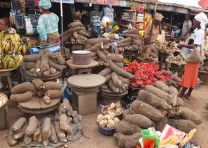
NBS: Food stuffs rises to 140% in Nigeria
NBS: Food stuffs rise to 140% in Nigeria is what this page would talk about.
Nigeria National Bureau of Statistics NBS recently announced the increment of food stuffs, particularly, Brown Beans, Yam, Garri, Tomatoes and Rice between April 2024.
The five food items are local rice, garri white, tomatoes, beans brown and yam.
The report said: “Selected Food Price Watch for April 2024 shows that the average price of 1kg Rice local sold loose stood at N1,399.34. This indicates a rise of 155.93% in price on a year-on-year basis from 546.76 recorded in April 2023 and 3.47% rise in price on a month-on-month basis from N1,340.74 in March 2024.
“The average price of 1kg of Garri white, sold loose increased by 134.98% on a year-on-year basis from N 362.50 in April of last year (2023) to N 851.81 in April 2024. On a month-on-month basis, the average price of this item increased by 13.59% from N749.89 in March 2024.
“The average price of 1kg of Tomato rose by 131.58% on a year-on-year basis from N485.10 in April 2023 to N1,123.41 in April 2024. On a month-on-month basis, it increased by 17.06% from N959.68 in March 2024. Furthermore, the average price of 1kg beans brown (sold loose) rose by 125.43% on a year-on year basis from N615.67 in April 2023 to N1387.90 in April 2024, while there was an increase of 12.44% on a month-on-month basis.
“Also, the average price of 1kg of Yam tuber increased by 154.19% on a year-on-year basis from N444.69 in April 2023 to N1,130.37 in April 2024. On a month-on-month basis, it increased by 5.76% from N 1,068.78 in March 2024 to N 1,130.37 in April 2024.”
Reasons why Food stuffs rises to 140% in Nigeria
The high cost of living in Nigeria is a pressing issue that affects many citizens. Some factors contributing to this include:
1. Economic instability: Nigeria’s economy has faced challenges, leading to inflation, currency fluctuations, and increased living costs.
2. Corruption: Widespread corruption and mismanagement of resources have led to inefficiencies and increased costs for basic necessities.
3. Import dependence: Nigeria relies heavily on imported goods, making it vulnerable to global market fluctuations and high import costs.
4. Infrastructure challenges: Inadequate infrastructure, such as power and transportation, increases the cost of living and doing business.
5. Population growth: Rapid population growth puts pressure on resources, leading to increased costs for housing, food, and other essentials.
6. Security challenges: Insecurity in some regions disrupts economic activities, leading to higher costs and reduced access to basic necessities.
7. Monetary policies: Central Bank policies, such as high interest rates, can contribute to increased living costs.
8. Political instability: Political uncertainty and instability can lead to economic instability and increased living costs.
9. Limited social safety nets: Nigeria’s social welfare system is underdeveloped, leaving many citizens vulnerable to economic shocks.
10. Climate change: Environmental degradation and climate change affect agricultural productivity, leading to higher food costs.
These factors combined create a challenging economic environment, making it difficult for many Nigerians to afford basic necessities. Addressing these underlying issues is crucial to reducing the high cost of living in Nigeria.







